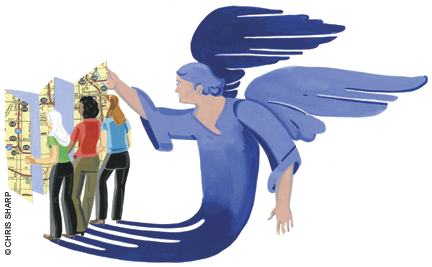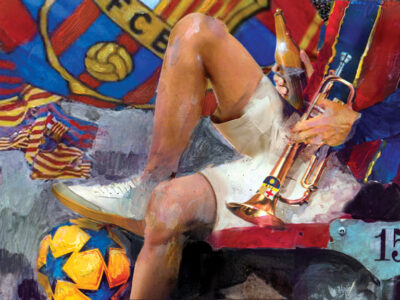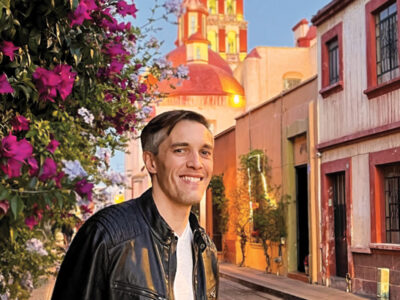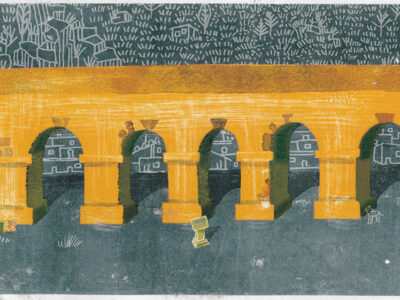
An interfaith trip to Turkey reveals the costs of self-insulation.
By Rachel Pomerance | I went to Penn for the Jews.
Sure, it’s a great school in a colorful city. And I visited during Spring Fling, becoming dutifully enraptured by young adults delighting in the independence and indulgence of college life.
But I craved comfort.
Penn, the so-called “Jewish Ivy”—some 30 percent of its roughly 20,000 students are Jewish, according to Hillel—fit.
I came from Atlanta, specifically a part of the city (Newt’s district) where I felt like an outsider for being Jewish. There was good reason. Parents at my high school organized “balls” for each grade in which one token Jewish girl was invited. It wasn’t me. Not to knock the South: My mother and her parents were born and raised in rural Georgia, where they were beloved, even amid the subtle strain of minority status.
In any case, I was eager to release the burden.
To be sure, Penn boasts all types of students from all types of backgrounds.
But when I was there, and I suspect this remains, we self-segregated. The Southeast Asians had their own parties, as did the Latinos. The African Americans staked out a section of the dining hall at 1920 Commons. And the kids from Manhattan dressed in black.
At Penn, and in the years since, I sought out the Jewy Jews. People who, like me, feel a deep sense of Jewish identity and community. While that has been nurturing, insulation has come with a cost. I’ve only recently realized this, and it took an interfaith trip across the world to convince me.
Because of my work as a freelance journalist, the Atlanta World Pilgrims program brought me along on a 10-day trek through Turkey, to visit sites that are holy or historically important to all three “Abrahamic” faiths.
Led by an imam, a Baptist minister, and a rabbi, there were 30 of us—Muslims, Christians, and Jews, half of us black, half of us white, all of us active in our respective Atlanta communities. Forced out of familiar routines and places, we were on a mission to learn about other religions and, in the process, each other.
World Pilgrims, a model program being studied by other U.S. cities, aims to transform interfaith relations in Atlanta, and thus the city itself, through grassroots missions to destinations like Israel, Turkey, and Spain. This was its fourth.
What I learned undid many of my beliefs, subconscious or not, because I found great comfort and commonality with people from entirely different backgrounds from my own.
Much of this became possible through the experience of travel, which is bound to bond people through new adventures. We would haggle together with the Turkish vendors, who routinely clasp their heart when you customarily offer half the going price. We took in incredible glories of nature—the nearly technicolor turquoise of coastal lakes, lava-born rock formations that give the appearance of “fairy castles” in the central region of Cappadocia—and, by sheer good luck, a total solar eclipse.
In that instance we unexpectedly found ourselves in the precise spot where astrologists had been planning a visit for six years. Standing on a hotel balcony in Konya, we watched in enchantment, as the midday sky dimmed to black in minutes—setting off a surge of wind and a flurry of black birds circling in confusion—and just as quickly returned to a safe state of sunshine.
And many of us experienced (though not all together) the Turkish bath, a delicate and furious operation that gives the sensation of being washed both like a car and a baby.
On our tour bus, we took turns at the mic, talking about our impressions of the trip and, often, the personal hardships that paved our paths.
All of these elements helped us to see ourselves in each other and to forge friendships.
We stayed away from the sticky points—like Middle Eastern politics—saving that conversation until we returned with a level of trust in place.
We did.
I was recently covering the movement within the Presbyterian Church to consider dropping its holdings in companies that do business with Israel. It’s a policy I’ve editorialized against as unsound and unfair, while its backers call it a morally responsible peace incentive. Among them, it turns out, is one of my closest friends from the Turkey trip.
Although her position disturbs me, I do take comfort in the fact that we built a foundation on which to hear each other’s arguments.
There were moments on the trip—from the hilarious to the profound, sometimes both—that enabled such insights and friendships.
Like the serenity of sitting on the worn carpet of a mosque, watching my friends kneel and bend in rhythmic worship, the energy of a rousing Baptist sermon, and late-night laughter over the inane.
What’s more, learning about other cultures gave me an even stronger understanding of my own Jewish identity among them. My rituals and heritage took on heightened value, and I felt a renewed appreciation for the complex and powerful bonds among my own people.
In part, the ease of the trip can be credited to the commonalities among the three monotheistic religions, and the fact that this was a self-selecting group of open-minded folks.
But I am not so stuck in its kumbaya afterglow as to forget there is evil in the world, much of it spawned by the differences among us. Not to mention the conflicts that arise from the best of intentions.
But knowing each other makes solving them with civility that much more likely.
For my part, the diversity of people I came to know and respect gave me a new sense of optimism and possibility, helping me trade suspicion for openness.
It’s tough to overcome our reflex for segregation. Maybe we identify as Southerners, who can insult you without you realizing it, or as Northerners, who can insult you in a way you can’t miss. Or we’re Jewish or black and defensively expect someone to type us. Whether it’s our gated communities, or our religions or the place we work out, we quarantine ourselves out of fear or habit.
We won’t all travel to Turkey on an interfaith mission. But we can and should put ourselves in cross-cultural situations. Because peace and understanding spread slowly, one connection at a time.
Rachel Pomerance C’97, an Atlanta-based freelance journalist specializing in religion, has written for the Atlanta Journal-Constitution, Time magazine, and various wire services.




